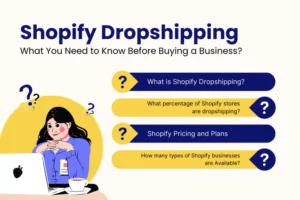In the fast-paced world of e-commerce, few platforms have left as significant a mark as Shopify. From its modest origins to its current status as a major player in the world of online commerce, the history of Shopify is a fascinating journey through innovation, adaptability, and entrepreneurship.
In this blog, we’ll delve into the story of Shopify, exploring how it has shaped the e-commerce landscape and what expert insights and advice it offers aspiring entrepreneurs.
The Genesis of Shopify
Shopify was founded in 2006 by Tobias Lütke, Daniel Weinand, and Scott Lake after they had difficulty setting up an online snowboard store. Make commerce better for everyone” is the company’s objective,” and it has done just that by providing a platform that makes it easy for anyone to start and manage an online store.
Shopify has grown rapidly in recent years, and it is now one of the leading e-commerce platforms in the world. In 2022, Shopify processed over $175 billion in gross merchandise value (GMV), with over 1.75 million merchants using its platform.
Dropshippers frequently use Shopify because it has various features that make launching and running a dropshipping business simple.
These qualities consist of:
- A various range of products to choose from
- Reliable suppliers
- A user-friendly platform
- Excellent customer support
Here are some stats about the Shopify dropshipping industry:
- By 2025, it is anticipated that the worldwide dropshipping industry will be worth $557.9 billion.
- Shopify is the most widely used e-commerce platform for dropshipping, which over 75 million retailers use.
- The Shopify dropshipping Store generates between $50 and $5,000
- The top 10% of Shopify dropshippers make over $100,000 per year.
It is important to note that these are just averages, and your success in dropshipping will depend on several factors, including the products you choose to sell, your marketing strategy, and your customer service.
Evolution and Adaptability of Shopify

One of the remarkable aspects of Shopify’s history is its commitment to evolution. Over the years, the platform has consistently adapted to changing market dynamics and technological advancements. Whether it’s the introduction of new features, integrations, or responsive design, Shopify has always stayed at the forefront of e-commerce innovation.
Expert Insights and Advice from Shopify

So, what insights and advice can we glean from Shopify’s journey? Here are some valuable lessons:
1. User-Centric Focus
Shopify’s success stems from its unwavering commitment to user-centric design. The platform’s user-friendliness and customization options have made it accessible to entrepreneurs of all levels. Lesson: Prioritize user experience and make your platform as user-friendly as possible.
2. Adaptability Is Key
Shopify’s willingness to adapt and embrace change has kept it ahead of the curve. It consistently updates its offerings to align with e-commerce trends and customer demands. Lesson: Be open to change and continuously evolve to stay relevant.
3. Supportive Ecosystem
Shopify has nurtured a supportive ecosystem of apps, themes, and experts, creating a one-stop solution for e-commerce needs. Lesson: Building an ecosystem around your product can add immense value and make your platform indispensable.
4. Scalability
Shopify has supported businesses of all sizes, from startups to global enterprises. Its scalability makes it attractive to a wide range of entrepreneurs. Lesson: Ensure your platform can grow with your users’ businesses.
5. Constant Innovation
Shopify’s commitment to innovation has driven its success. It consistently introduces new features and improvements. Lesson: Innovation is vital to staying competitive and appealing to your audience.
What are the key milestones in the history of Shopify’s development and growth as an e-commerce platform?
- 2006: Shopify was founded by Tobias Lütke, Daniel Weinand, and Scott Lake.
- 2009: Shopify launches its app store and API, allowing developers to create and sell apps for the platform.
- 2010: Shopify receives $7 million in Series A funding.
- 2011: Shopify launches its international expansion, opening offices in Canada, the United States, and the United Kingdom.
- 2013: Shopify launches Shopify Payments, allowing merchants to accept payments directly on their websites.
- 2014: Shopify launches Shopify Plus, a high-end version of Shopify for enterprise-level businesses.
- 2015: Shopify and Amazon have a partnership that enables Shopify sellers to sell their goods on the Amazon marketplace.
- 2016: Shopify launches Shopify POS, allowing merchants to sell products in person using the Shopify platform.
- 2017: Shopify goes public on the New York Stock Exchange.
- 2018: Shopify launches Shopify AR, allowing customers to view products realistically before purchasing.
- 2019: Shopify launches Shopify Capital, a financing program that provides merchants with access to capital to grow their businesses.
- 2020: Shopify launches Shopify Pay, a buy-now, pay-later option that enables consumers to acquire and pay for goods over time.
- 2021: Shopify launches Shopify Fulfillment Network, a network of fulfillment centers that helps merchants store and ship their products.
Shopify has grown rapidly since its founding in 2006. In 2022, Shopify processed over $175 billion in gross merchandise value (GMV), with over 1.75 million merchants using its platform. One of the top e-commerce platforms in the world right now is Shopify, and businesses of all sizes use it.
How did the founders’ initial frustrations with e-commerce platforms lead to the creation of Shopify?
Shopify was founded in 2006 by Tobias Lütke, Daniel Weinand, and Scott Lake after they had difficulty setting up an online snowboard store. The three friends had a difficult time finding an e-commerce platform that was both easy to use and affordable. They also found that the existing platforms were not very flexible, making it difficult to customize their Store to their liking.
These annoyances inspired them to develop Shopify, an e-commerce platform that is simple, reasonably priced, and adaptable. Regardless of their technical expertise or experience, anybody can easily develop and run an online store with Shopify. Additionally, Shopify provides various features and customization choices so business owners may design a shop exclusive to their operation.
Businesses of all sizes utilize Shopify, which has emerged as one of the world’s top e-commerce platforms. Shopify’s success is partly due to the founders’ initial frustrations with e-commerce platforms. These frustrations led them to create a platform that is easy to use, affordable, and flexible.
Here are some of the key features that make Shopify so popular:
- Easy to use: Shopify is designed to be easy, even for people without technical skills. Merchants can create and manage their stores using a simple drag-and-drop interface.
- Affordable: Shopify offers a variety of pricing plans, making it affordable for businesses of all sizes.
- Flexible: Shopify offers a wide range of features and customization options so merchants can create a unique store for their business.
- Reliable: Shopify is a reliable platform with a good uptime and performance track record.
- Scalable: Shopify can handle even the largest online stores.
What core principles have Shopify upheld to maintain its user-centric focus over the years?
Shopify has upheld several core principles to maintain its user-centric focus. These principles include:
- Listening to users: Shopify actively listens to its users and considers their feedback when developing new features and making changes to the platform.
- Focusing on ease of use: Shopify is designed to be easy, even for people without technical skills. Merchants can create and manage their stores using a simple drag-and-drop interface.
- Providing excellent customer support: Shopify offers excellent customer support to its users. Merchants can get help with Shopify 24/7 through various channels like email, live chat, and phone support.
- Investing in education and training: Merchants may turn to Shopify for several instructional offerings when learning how to utilize the platform and expand their companies. Shopify also offers training programs to help merchants learn new skills and improve their businesses.
- Building a community: Shopify has built a strong community of merchants and developers who support each other and share their knowledge. Shopify also hosts various events and meetups where merchants can network and learn from each other.
These core principles have helped Shopify to maintain its user-centric focus over the years. Shopify is dedicated to giving its customers the greatest experience possible and is always trying to enhance its platform and services.
Here are some examples of how Shopify has put its core principles into action:
- Shopify has a team of user experience (UX) researchers dedicated to understanding the needs of Shopify merchants. These researchers conduct user interviews, surveys, and usability testing to gather feedback from merchants. Shopify also has a dedicated customer support team to help merchants with problems.
- Shopify offers a variety of educational resources to help merchants learn how to use the platform and grow their businesses. These resources include online courses, webinars, and blog posts. Shopify also offers training programs to help merchants learn new skills and improve their businesses.
- Shopify has built a strong community of merchants and developers who support each other and share their knowledge. This community is active on social media and the Shopify forums. Shopify also hosts various events and meetups where merchants can network and learn from each other.
Here are some of the latest stats about Shopify’s user-centric approach:
- Shopify has over 75 million merchants using its platform.
- Shopify merchants processed over $175 billion in gross merchandise value (GMV) in 2022.
- Shopify has a customer satisfaction rate of 92%.
- Shopify’s user community is active on social media and the Shopify forums, where they share their knowledge and support each other.
- Shopify hosts events and meetups yearly where merchants can network and learn from each other.
How has Shopify continually adapted and evolved to lead the e-commerce?
Shopify has continually adapted and evolved to lead the e-commerce industry in terms of technology and trends by:
- Investing heavily in research and development: Shopify invests heavily in research and development to ensure its platform is always at the forefront of e-commerce technology. This involves investing in cutting-edge technology like augmented reality, machine learning, and artificial intelligence.
- Acquiring innovative companies: Shopify has acquired several companies in recent years, such as Oberlo, Kit, and Affirm. These acquisitions have helped Shopify expand its platform and add new valuable features and services to its merchants.
- Partnering with other companies: Shopify has partnered with several companies, such as Amazon, Facebook, and Google. These partnerships have helped Shopify reach a wider audience and offer merchants more ways to sell their products.
- Listening to its merchants: Shopify actively listens to its merchants and considers their feedback when developing new features and making changes to the platform. This ensures that Shopify’s platform is meeting the needs of its merchants.
Here are some specific examples of how Shopify has adapted and evolved to lead the e-commerce industry:
- Shopify was one of the first e-commerce platforms to offer mobile-friendly stores.
- Shopify was one of the first e-commerce platforms to integrate with social media platforms.
- Shopify was one of the first e-commerce platforms to offer a buy now, pay later solution.
- Shopify was one of the first e-commerce platforms to offer a fulfillment network.
- Shopify was one of the first e-commerce platforms to offer a point-of-sale system.
In addition to the above, Shopify is also working on several other initiatives to maintain its leadership in the e-commerce industry. These initiatives include:
- To assist retailers in automating processes, they should invest in artificial intelligence and machine learning, personalize the shopping experience for their customers, and make better business decisions.
- It is expanding its logistics network to assist retailers in more quickly and effectively delivering their items to customers.
- She is facilitating the sale of goods by merchants on international marketplaces.
- They provide more support for merchants who want to sell their products in person.
Here are some of the latest stats about Shopify’s innovation and leadership in the e-commerce industry:
- Shopify invests over 10% of its revenue in research and development.
- Shopify has acquired over 20 companies in the past five years.
- Shopify has partnerships with over 1,000 companies.
- Shopify has over 1.75 million merchants using its platform.
- Shopify merchants processed over $175 billion in gross merchandise value (GMV) in 2022.
What is the significance of Shopify’s ecosystem of apps, themes, and experts, and how does it benefit its users?
Shopify’s ecosystem of apps, themes, and experts is significant because it allows merchants to customize and extend their Shopify stores to meet their specific needs. This can help merchants to improve the customer experience, increase sales, and grow their businesses.
- Apps
Shopify apps are software extensions that can be added to a Shopify store to add new features or functionality. Over 8,000 Shopify apps cover various categories: marketing, sales, shipping, and customer service.
- Themes
Shopify themes control the look and feel of a Shopify store. Over 100 free and premium Shopify themes are available, and merchants can also create their custom themes.
- Experts
Shopify experts are freelancers and agencies that can help merchants with various tasks, such as store setup, theme customization, and app development. Over 50,000 Shopify experts with a wide range of skills and experience are available.
Benefits of Shopify’s ecosystem

The Shopify ecosystem of apps, themes, and experts benefits users in several ways, including:
- Customization: Shopify’s ecosystem allows merchants to customize their stores to meet their needs. This can assist retailers in differentiating themselves from the competition and offering their consumers a special shopping experience.
- Extensibility: Shopify’s ecosystem allows merchants to extend the functionality of their stores with apps. This can help merchants add new features and functionality without coding.
- Expertise: Shopify’s ecosystem of experts can help merchants with various tasks, such as store setup, theme customization, and app development. This can be helpful for merchants who need more time or expertise to do these tasks themselves.
What valuable expert insights and advice can entrepreneurs gain from Shopify’s history?
Entrepreneurs can gain valuable expert insights and advice from Shopify’s history when launching or growing their e-commerce ventures. Here are a few examples, along with some supporting stats:
- Please focus on the customer experience: Shopify has always focused on providing a great customer experience for its merchants. This involves offering products and services, first-rate customer support, and making it simple for retailers to set up and maintain their businesses. The actual customer satisfaction rating for Shopify is 92%.
- Advice: Entrepreneurs should focus on providing a great customer experience for their customers as well. This can be done by offering easy-to-navigate websites, fast shipping, and excellent customer service.
- Invest in technology: Shopify has made significant technological investments over the years. As a result, it has kept on top of developments and provided its merchants with the newest features and services. For example, Shopify was one of the first e-commerce platforms to offer mobile-friendly stores and social media integration.
- Advice: Entrepreneurs should also invest in technology to help them run their businesses more efficiently and effectively. This could involve investing in e-commerce software, marketing automation tools, and analytics software.
- Build a community: Shopify has built a strong community of merchants and experts who support each other and share their knowledge. For example, Shopify hosts several events and meetups yearly where merchants can network and learn from each other.
- Advice: Entrepreneurs should also build a community around their businesses. This could be done by joining online forums and communities, attending industry events, and networking with other entrepreneurs.
- Be adaptable: As the demands of its merchants changed over time, Shopify was able to adapt and grow. For example, Shopify recently added a new feature that allows merchants to sell subscriptions. This feature is valuable to merchants selling software, meal kits, and beauty boxes.
- Advice: Entrepreneurs should also be adaptable and willing to change their strategies as needed. This could involve changing product offerings, target markets, or marketing strategies.
Shopify’s history is valuable for entrepreneurs launching or growing their e-commerce ventures. By following the insights and advice of Shopify’s founders, entrepreneurs can increase their chances of success.
FAQs about the History of Shopify

How do I become a Shopify expert?
To become a Shopify expert, start by learning the platform inside out, taking Shopify’s certification courses, building your own Shopify store, gaining practical experience, and considering specializing in certain aspects like design, development, or marketing.
Who is the best Shopify expert?
The “best” Shopify expert can vary depending on your specific needs. Look for professionals with a successful track record, glowing customer testimonials, and expertise in the area you require, such as design, development, or marketing.
Is Shopify good for beginners?
Yes, Shopify is beginner-friendly, offering an easy-to-use platform with plenty of resources and support for those new to e-commerce.
How much can you earn from Shopify?
Earnings from Shopify can vary significantly, depending on factors like the niche you choose, marketing efforts, product pricing, and competition. Some entrepreneurs make a modest income, while others generate substantial profits.
How to earn from Shopify in the USA?
Earning from Shopify in the USA involves selecting a niche, setting up a store, sourcing products, marketing effectively, and providing excellent customer service to attract and retain customers.
Which product is best to sell on Shopify in the USA?
The best product to sell on Shopify in the USA depends on market trends and your target audience. Research and select products that align with customer needs and preferences.
Which payment method is best in the USA for Shopify?
Shopify supports various payment methods in the USA, including Shopify Payments, PayPal, credit cards, and more. The best payment method depends on your customers’ preferences and the fees associated with each option.
Who is the best Shopify-earning Store?
You can obtain high-quality pre-built Shopify stores from BeBiggy, a reliable source offering a diverse range of fully optimized eCommerce stores designed for your convenience.
How much does a Shopify website cost in the USA?
The cost of a Shopify website in the USA depends on your plan (Basic, Shopify, or Advanced), any added apps or features, and the design. Plans typically start at $29 per month.
What is the cheapest price for Shopify?
The cheapest Shopify plan is the “Basic Shopify” plan, which starts at $29 monthly. However, additional fees, such as transaction and credit card rates, must be considered.
Conclusion
The history of Shopify is a testament to the transformative power of entrepreneurship and innovation. Its journey from a snowboarding store to a global e-commerce leader offers valuable insights to aspiring entrepreneurs.
Shopify’s legacy is a reminder that success in e-commerce hinges on adaptability, user-centric design, and continuous innovation. As you embark on your entrepreneurial journey, consider these lessons from Shopify’s history. It’s a testament that with the right vision and determination, you can unlock the wealth and shape the future of e-commerce.










 What Is Shopify Dropshipping and How Does It Work?
What Is Shopify Dropshipping and How Does It Work?  Shopify Dropshipping: What You Need to Know Before Buying a Business?
Shopify Dropshipping: What You Need to Know Before Buying a Business?  How to Dropship on Shopify: Step-by-Step Guide
How to Dropship on Shopify: Step-by-Step Guide  Guide to Finding Reliable Shopify Dropshipping Suppliers [100% Success]
Guide to Finding Reliable Shopify Dropshipping Suppliers [100% Success]